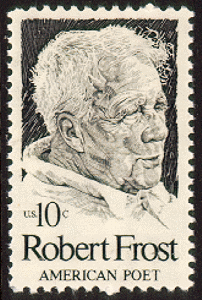
April, now nipping at the last days of March, will celebrate poets as National Poetry month. The Greenwich Sentinel will honor National Poetry month by reprinting a selection of Robert Frost’s poems each week. It is especially fitting because Robert Frost worked for a short time at The Lawrence Sentinel newspaper as a reporter.
A four-time winner of the Pulitzer Prize, Robert Frost is our quintessential New England poet.
He was born 144 years ago this week. His commemorative stamp, issued 44 years ago on the 100th anniversary of his birth, was created from a pencil drawing by Paul Calle (of Stamford, CT), based on a photograph by David Rhinelander (of Hartford, CT). Beneath the portrait are his name and simply “American Poet.”
The year that Robert Frost’s stamp was issued, the New York Times wrote, “Several generations of older Americans still remember vividly the inauguration of President John F. Kennedy in 1961. There was Robert Frost, the first poet ever to be taking part in inaugural, ceremonies, his white hair blowing in the bitter cold, his eyes blinking in the glare of the wintry sun, as he tried again and again to read a work written especially for the occasion.”
Frost could not manage his papers against the wind and so, recognizing there was no walking away without having recited a poem, he set aside the poem he had written for this day and instead recited from memory a previously written and published poem, The Gift Outright.
Later he expanded the unread poem, which had been called The Preface, from 42 to 77 lines and renamed it For John F. Kennedy: His Inaugural–and presented it to his friend and fellow New Englander, the President, in 1962.
That same year, he traveled to Russia and courageously read his poem Mending Wall at a Moscow literary evening. The poem, which begins, “Something there is that doesn’t love a wall,” seemed to be read as an indirect condemnation of the Berlin wall.
President Kennedy said, “[Robert Frost] saw poetry as the means of saving power from itself. When power leads man towards arrogance, poetry reminds him of his limitations. When power narrows the areas of man’s concern, poetry reminds him of the richness and diversity of his existence. When power corrupts, poetry cleanses.”
Frost was awarded the US Congressional Gold medal for his contribution to the culture of the United States. He also won four Pulitzer prizes for his poetry collections in 1924, 1931, 1937, and 1943.
Robert Frost died at the age of 88. On his tombstone is written a line from one of his own poems. It reads, “I had a lover’s quarrel with the world.“
It is unclear if Frost intended that line from his poem, The Lesson for Today, to be used as the epitaph on his gravestone. It was included in the collection A Witness Tree in 1942, twenty years before his death.
The last two lines of the poem read:

“I would have written of me on my stone: I had a lover’s quarrel with the world.” Intended or not, it seems perfect for the occasion, again. Interpreted and reinterpreted and universally applied to each one of us.




